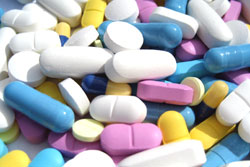Transcript
It’s sometimes hard to remember that things like antibiotics, which are so commonplace today, are a relatively new invention in terms of human history.
Hi, I’m Dr Joe.
Penicillin was first discovered in around the 1940s. Prior to that, if you got a bacteria, there was two possibilities: you ether got better by yourself, or you died. After the discovery I suppose, not invention, of penicillin, it was regarded as the silver bullet, and a magic treatment for a whole lot of ailments. And certainly for bacterial infections, it is very useful – for those bacteria, which are sensitive to penicillin. Since the end of WWII we’ve seen the development of a whole range of other antibiotics and whilst bacteria have not been completely defeated we’re certainly able to treat infections far better than days gone by.

There’s never such a thing as a free lunch, though, and antibiotics have the potential to be over used. As medical history has advanced we’ve gone from being able to see things with the naked eye to being able to see things with a microscope, through to the development of the electron microscope. And it was when this was developed that we were able, for the first time, to see viruses. This was a very important point because up until that time it was assumed that bacteria were the cause of most infections. In fact, it was thought than influenza was caused by a bacteria, then we discovered that it was caused by a virus. So what of course happened is when people had cold or flu type illnesses, it was assumed that we could treat these with an antibiotic and they got better.
Today we know better, unfortunately there still is a tendency for both doctors and sometimes patients to think, “if I’m unwell I must need an antibiotic.” Let me be very, very clear on this point: if you have a viral illness, one caused by a virus then there is no need or point to take an antibiotic. If you have a bacterial infection, for example, bronchitis or pneumonia, in children a middle ear infection or urinary tract infection, there are others, then those infections will respond to an antibiotic that that bacteria is sensitive to.
There’s also been a view that “oh well, if I take an antibiotic and I don’t need it, it doesn’t really matter.” It does matter. Bacteria have been around on the planet before humans and they haven’t survived billions of years by being completely stupid. They may be small, but they are survivors and they survive by adapting. So when we’re using antibiotics that aren’t necessary, bacteria that are sensitive to it die off. But those that develop resistance to the antibiotic survive and multiply, and we now have a situation where there are a number of bacteria that are resistant to a whole range of antibiotics. In addition to that, we can also knock out a good bacteria from the gut if we take a course of antibiotics unnecessarily.
So what’s the bottom line? Antibiotics of all forms are still useful for us, but they should be used whenever necessary. You wouldn’t generally take a painkilling tablet if you didn’t have any pain, and you shouldn’t use an antibiotic unless there is a reason to do so. So when you’re unwell and you’re not sure, that’s the time to go along to your doctor. If you have a virus, you won’t get a script for an antibiotic and it won’t do you any good. And not only may it do you a little bit of harm, but it helps the bacteria to develop more resistance which could be bad for all of us. If you do need an antibiotic, then that can still be prescribed if you have a bacterial type infection.
More information
 |
For more information about Antibiotics, including how they work and are administered, see Antibiotics. |
All content and media on the HealthEngine Blog is created and published online for informational purposes only. It is not intended to be a substitute for professional medical advice and should not be relied on as health or personal advice. Always seek the guidance of your doctor or other qualified health professional with any questions you may have regarding your health or a medical condition. Never disregard the advice of a medical professional, or delay in seeking it because of something you have read on this Website. If you think you may have a medical emergency, call your doctor, go to the nearest hospital emergency department, or call the emergency services immediately.







